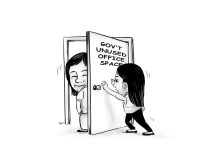
[av_one_full first min_height=” vertical_alignment=” space=” custom_margin=” margin=’0px’ padding=’0px’ border=” border_color=” radius=’0px’ background_color=” src=” background_position=’top left’ background_repeat=’no-repeat’ animation=”]
[av_heading heading=’Universality and Particularity’ tag=’h3′ style=’blockquote modern-quote’ size=” subheading_active=’subheading_below’ subheading_size=’15’ padding=’10’ color=” custom_font=”]
BY JED JALECO DEL ROSARIO
[/av_heading]
[av_textblock size=” font_color=’custom’ color=’#0a0a0a’]
Sunday, January 22, 2017
[/av_textblock]
[av_textblock size=” font_color=’custom’ color=’#0a0a0a’]
NEW YORK-based Human Rights Watch recently released a report entitled, “World Report 2017: Demagogues Threaten Human Rights.” Among those included in this report was our very own President Rodrigo Duterte.
The report said, “Since taking office on June 30, 2016, Duterte and senior government officials have praised the killing spree of suspected drug dealers and drug users and resisted holding those responsible to account.”
Ironically, the report itself seems to have some traces of demogagory of its own. It states, for example, that the “the world risks entering a dark era,” and even compares President Duterte with US President Donald Trump and various European Populists candidates.
According to the HRW’s report, these political figures represent a “new generation of authoritarian populists who seek to overturn the concept of human rights protections, treating rights as an impediment to the majority will.”
Of course, it’s not demagoguery when politicians like Obama preach on and on about “Change” and “Hope,” but let’s not digress. The important point to remember here is that according to groups like Human Rights Watch, Duterte belongs to the same class of leaders as Putin, Trump and various European populists.
Now, I’m sure that there are many Filipinos out there who will staunchly beat their breasts and proclaim that Duterte is nothing like Trump, who is an (insert evil description here), and they would be correct to say so, but only from their perspective.
From the perspective of groups like Human Rights Watch, Duterte and Trump are the same because they represent nationalism, populism and hostility to universal moral and ethical abstractions (i.e. human rights).
What Filipinos need to understand about human rights is that it is a fundamentally universal idea that applies to all countries, regardless of whether they agree with it or not. After all, what kind of monster would be opposed to “human rights?” It’s like opposition to love and compassion.
The trouble with the human rights position is when it comes into conflict with national sovereignty and local laws, because it forces people to choose one over the other. If you want human rights then you must accept that it is more important than national sovereignty. On the other hand, if you choose national sovereignty then you undermine the universalistic foundation of human rights.
If this seems too abstract then let us restate this in another way. What many human rights advocates are trying to say with regards to Duterte’s policies is that national sovereignty / interests should end where universal concepts, like human rights, begin. Basically, they are saying that there should be limits to what sovereign nations can do in their own territories, and that in any contest between human rights and sovereignty the former should win.
This is the reason why Duterte is often compared with foreign populist, nationalist leaders.
In Europe, for example, human rights advocates argue that European governments should not restrict immigration because it violates the human rights of immigrants and minorities.
Now, you could argue that Duterte’s war on drugs has little or nothing to do with keeping out immigrants, but you would be wrong. What both situations have in common is that they both oppose human rights. Trump’s protectionism/isolationism, Putin’s nationalism and the European populist’s anti-immigration policies – All of these are in opposition to human rights abstractions.
Now, this conflict of ideas can be a difficult issue to reconcile or resolve for some Filipinos because of the Filipino diaspora. After all, millions of Filipinos who travel or work abroad are partly protected by human rights.
However, it’s also important to remember the distinction. Overseas Filipinos are protected by human rights on the basis of being human beings, and not because they are Filipinos. The same argument can be applied to Filipino criminals and criminal suspects. As Filipinos, they are subject to Philippine law, but as human beings, they are protected by human rights laws.
So the greater question here is, which is more important? Your rights as a human being or your rights as a Filipino.
Furthermore, what if national interests conflict with the universality of human rights.
Which would you choose?/PN
[/av_textblock]
[/av_one_full]







